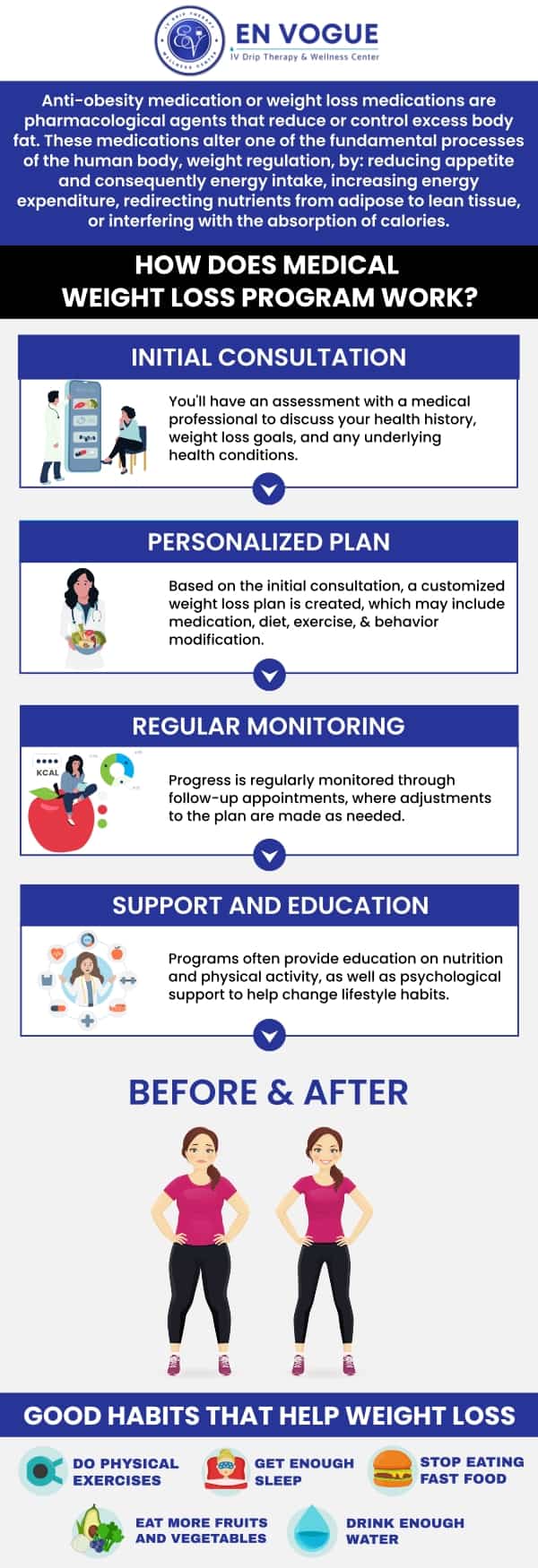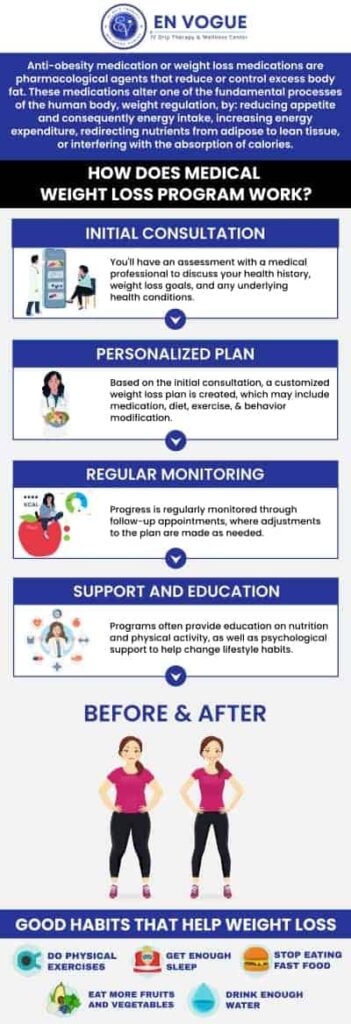Transform Your Health with a Medical Weight Loss Program in Southampton, PA
Considering medical weight loss? Get the information you need to make an informed decision about your health and weight management goals. Our healthcare professionals at En Vogue IV Therapy and Wellness are experienced and knowledgeable about medical weight loss and can help you lose the extra unnecessary weight. To consult with our professionals, contact us or book an appointment online. We are conveniently located at 44 2nd St Pike Suite 303 Southampton, PA 18966.




Table of Contents:
What is medical weight loss?
What should my goal weight be?
How long should it take me to reach my goal?
How will losing weight impact my health?
Transform Your Health and Wellness with Our Medical Weight Loss Program at En Vogue IV Therapy & Wellness
Medical weight loss is a healthy and medically known way to help you lose excess weight more effectively, safely, and easily than if you were to do it on your own.
Medical weight loss is a journey with guidance and help from a healthcare professional like ours at En Vogue IV Therapy and Wellness. The medical weight loss physicians will use their knowledge and medical experience to help you attempt to lose the excess weight and create a realistic plan that meets your lifestyle, and any unique circumstances you may be dealing with.
Physicians are also able to help you find and keep the motivation necessary for weight loss success. Certain components are used for a successful weight loss journey, it starts with the initial consult, your behavioral changes, and finally, weight loss medications.
Initial Consultation
During the initial consultation, the physician will ask questions to get to know you better and to review your health information, as well as your weight loss goals. This way, they can create a realistic plan with you that is achievable and can be maintained.
Behavior Modification
Changing behaviors is one of the top ways for you to lose weight. When it is gained, your energy is being taken through food that is already being eaten and then being expended through activity. Weight is lost when you begin to use more energy during activities than what is being taken in through food, which is known as a deficit. If you are maintaining a calorie deficit, it will influence weight loss, as well as eating foods that are lower in energy while maintaining higher levels of activity will influence healthier weight loss habits.
Diet
The energy that comes from food is measured in calories. When following a medical weight loss program, our doctors will create a plan specifically for you and your weight loss journey, which will include foods that are lower in calories.
Calories will come from a variety of different sources and will ultimately affect how you gain or lose weight. Our doctors will review with you all of the information and recommend a plan they believe will be the most successful for your medical weight loss.
Exercise
Exercise is an important aspect of losing weight, this is due to the extra activity that will help your body burn the extra stored energy that is storing away fat within the body and use it more effectively. Our doctors will recommend various workout routines based on your level of experience and help you find exercises that will work with your lifestyle.
Weight loss medications
Weight loss medication(s) can be prescribed by our doctors to help complement your weight loss journey and exercises; however, they may not always be necessary, but these medications will be prescribed at the discretion of your doctor.
Weight loss medications help your body to burn the extra stored energy, while this may seem incredible, and you may be wondering why everyone isn’t provided weight loss medication, it is because it isn’t a magic weight loss pill. These medications still do come with negative side effects, our doctors will monitor you if you are on them to make sure you are staying healthy while taking them.
Everybody is different, and multiple factors play into determining what your goal weight should be. The multiple factors include age, sex, and height, but other factors like mental factors are just as important as well. Often your goal weight will be measured through a medical tool known as your BMI. BMI is short for Body Mass Index, and there are many calculators available online that will help you to see what you should be near for your goal weight. However, these calculators do not take in factors other than height and weight, so while we do use them on a medical basis, they are an estimate, not an exact frame to stick to. Our doctors will go over this with you during your initial consultation, and help you understand what goal should be acceptable.
The length it will take to reach your goal weight will depend on a few things, current weight, your activity level, gender, and age. On average, it is recommended to lose around 1.5 to 2 lbs per week. In the first few weeks of your new plan, you may lose more, this is normal as you are changing up your entire routine and lifestyle to lose the excess weight.
Losing weight to a more sustainable and healthy weight goal will eliminate any health issues and even lower your odds of having health issues occur. Weight loss can reduce your blood pressure, as well as your cholesterol levels, and can take a major hit at reducing your risk for heart disease, diabetes, stroke, osteoarthritis, and gallbladder disease.
At En Vogue IV Therapy & Wellness, our medical weight loss program combines personalized care, medical interventions, and lifestyle coaching to support long-term health transformation. Whether you’re looking to lose weight, optimize metabolism, or improve overall health, we offer a comprehensive, patient-focused approach. Our team evaluates your unique needs, provides treatments like Semaglutide GLP-1 or Tirzepatide, and works with you to create lasting changes for a healthier, more balanced life.
For more information, contact us or book an appointment online. We are conveniently located at 44 2nd St Pike Suite 303 Southampton, PA 18966. We serve patients from Southampton PA, Willow Grove PA, Horsham PA, Warrington PA, Warminster PA and surrounding areas.





